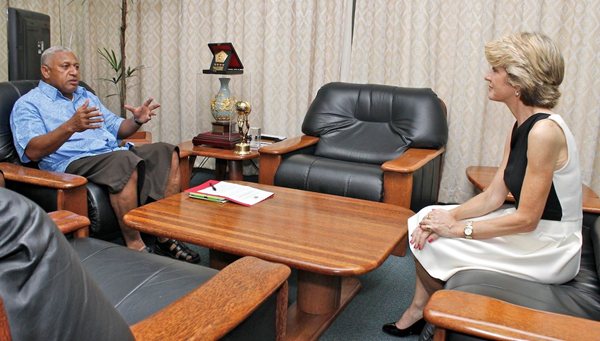Australia likes the existing South Pacific system, while Fiji wants to change it. Even if Fiji returns to democracy, the prospect is for continuing competition between Suva and Canberra over competing visions of the regional future: who’s in, who’s out, and who decides.
As the South Pacific superpower, Australia is committed to playing the central role in the maintenance of the regional status quo. Not the least element in the Australian vision of the established order is its assumed entitlement to the full membership rights of a South Pacific insider. Australia always wants to be a power perceived as being in the South Pacific as well as being the South Pacific power. The gap in that distinction has been probed, teased and tested by Fiji’s Supremo.
Under Frank Bainimarama, Fiji has shifted a long way from its role as the conservative centre of the region and champion of the gradualist, consensual ‘Pacific Way’. Fiji has become the revisionist power that wants changes to the regional system to realign power, fix injustices and better serve its interests. Not the least of that revision would be to strip Australia of its status as an insider. A big bit of Fiji’s revisionist agenda would be to redefine regionalism so that Australia isn’t part of the South Pacific. In this revision, New Zealand would also be expelled—Canberra and Wellington would become powerful outsiders, not natural insiders.
Much is to be played for as Canberra and Suva try to hit the reset button in their fractious and fractured relationship. The focal issue is Fiji’s democracy; but over long years of battle, the contest has broadened to become a fight about the South Pacific system.
The bonhomie of the meeting between Fiji’s Supremo and Australia’s Foreign Minister was based on the elections Bainimarama has promised by September and Julie Bishop’s determination to normalise relations. The Suva meeting was the first time a senior Australian government minister has met Bainimarama since 2008.
The picture from the talks had a football flavour, with Bishop presenting Bainimarama with a West Coast Eagles AFL jersey signed by Nic Naitanui, a towering Fijian who plays Australian rules footy. No jokes please about Bainimarama being asked to play by Aussie rules again, although that reflects how Canberra would like to see normalisation work. On the other side of the elections, Australia wants Fiji to come back into the Forum and to come to some fresh acceptance of the old regional status quo.
Fiji’s clear interest is to win back what it has lost—international status as a democracy, membership of the Forum, full recognition of the prerogatives of the Suva elite that serve the Supremo and a comfortable economic relationship with Australia— while pushing on with revisions to the way the Pacific operates. This is the long game in the new dance between Suva and Canberra. The aim of the reset expressed in Bishop’s meeting with Bainimarama is to see what levels of accommodation can be achieved.
The effort will be to shift beyond anger and argy bargy. Lots of baggage from recent history has to be rearranged, stored for later or politely forgotten. Since Bainimarama imposed his second successful coup in 2006, Australia and Fiji have been bristling at each other. The differences go beyond the principle of democracy versus military dictatorship; the struggle has turned into this contest— status quo power versus revisionist state— over how the South Pacific should work. Fiji’s elections won’t see an end to that contest.
Richard Herr went to those systemic issues in his musings on the guns-and-roses symbolism of the Valentine’s Day meeting between Bishop and the Supremo:
Fiji’s relationship with the Pacific Islands Forum won’t necessarily be repaired by the bilateral re-engagement, nor will Australia’s role in the regional body return to pre-sanction levels. Prime Minister Bainimarama is currently building a headquarters for a new regional body that excludes Australia and is intended to parallel the PIF. The regional roles for Fiji and Australia have been forced apart by Fiji’s suspension from the PIF orchestrated by Canberra. Reconvergence is not impossible but it’s unlikely to be fully achieved any time soon. Regional affairs will remain a separate and significant issue for Australia.
Significant, indeed. There’s a lot to play for. On a stylistic point, I’ll have to stop calling Bainimarama the Supremo when he renounces his job as head of the military and settles for merely being Prime Minister. Following the New Order script, the civilian leader can then announce the creation of his Golkar-style political party—a new form of movement not tainted by old party politics.
It’s in Australia’s interest to embrace whatever level of democracy Fiji is allowed to have. And to achieve a normalisation of relations that restores as much of the regional status quo as is achievable. My next columns will consider the sweet and sour aspects of the goodies Australia is offering Fiji in trying to reset the relationship.
Graeme Dobell is the ASPI journalism fellow. Image courtesy of the Fijian Government.


